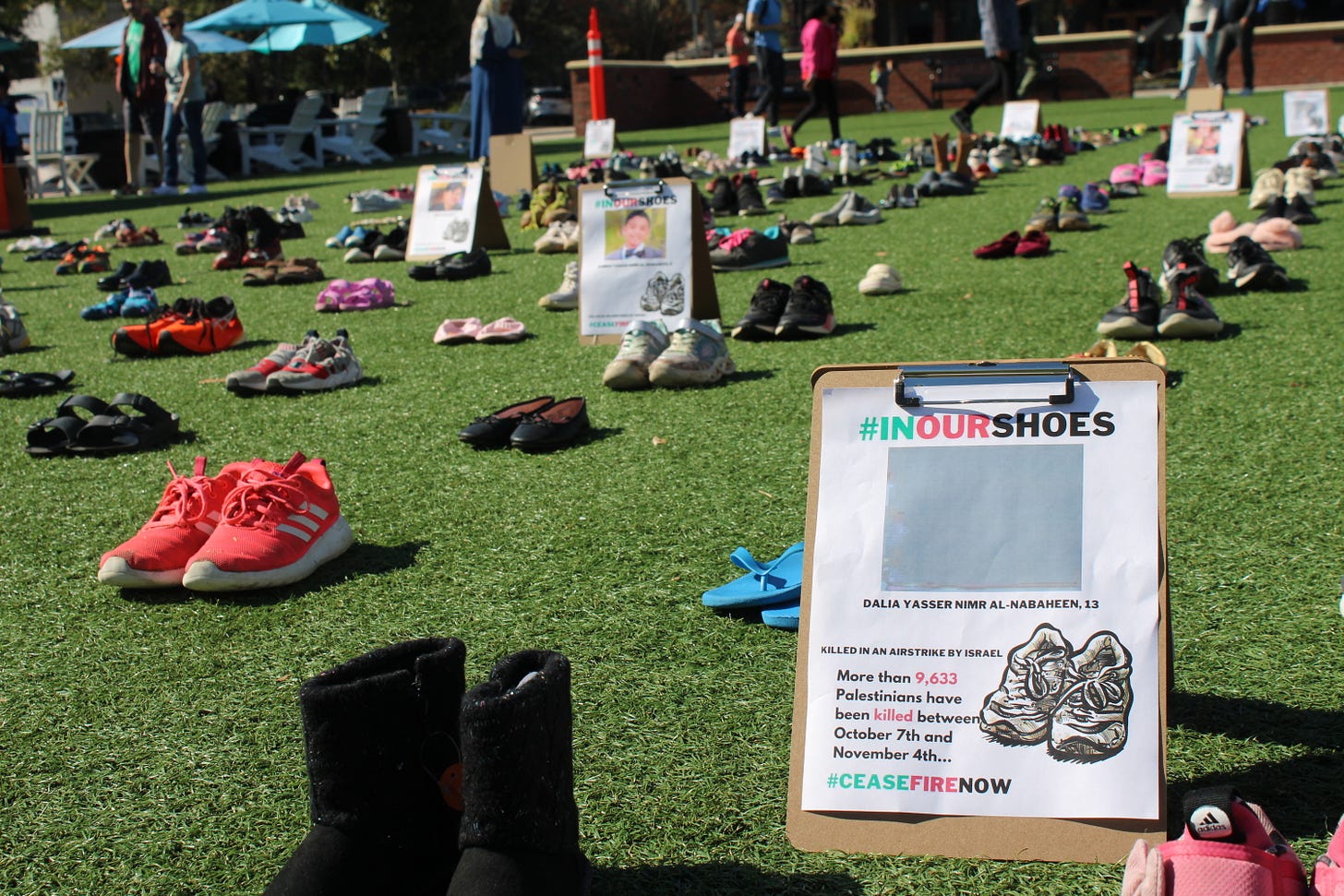“This has been a wakeup call.”
Muslim community leaders in Georgia are responding to the violence in Gaza, saying they feel “betrayed” and “disappointed” by Biden Admin, and determined to make their voices heard.

In downtown Alpharetta on Sunday, Asra Mansoor stood beside more than 400 pairs of childrens’ shoes spread out on the grass. At one end of the square hung a banner with the names of some of the more than 4,000 children who have been killed since the Israeli government began its bombardment campaign in Gaza in response to Hamas attacks on Israel on October 7.
Asra had worked with other volunteers from Voices of Muslims (VoM), a grassroots civic engagement organization in Georgia, to set up the exhibit. They gathered the shoes from local mosques and from community members over the course of a few days to set it up. Their goal, they said, was to help inform passersby about the humanitarian toll of the war, and to encourage them to join the call for a ceasefire in the region.
“It’s very disappointing to see that’s not happening,” said Asra, who voted for Biden in 2020, and lives in Cumming. “He’s not even paying attention…no way will we vote for him again.”
Asra represents a growing and critical minority in Georgia—Muslim Americans, over 60,000 of whom showed up to vote in 2020. In a state where Biden won by just 12,000 votes, the historic turnout in minority communities was heralded as instrumental in swinging the state blue.
But the Administration’s stance on the Israel-Gaza war has changed political sentiments: Muslim Americans in Georgia who spoke to 285 South said they felt “betrayed” and “disappointed” by the White House’s stance, and can’t imagine voting for him again.
“We are done,” said Asra.
That change has come swiftly. Just four months earlier, she was emceeing a gala dinner in downtown Atlanta, celebrating with fellow VoM volunteers. Over 400 people were in attendance at the event, including Senator Jon Ossoff, who gave the keynote address, the Mayor of Suwanee, and several state lawmakers. They were all there to mark a milestone in the community: 30 cities and six counties in Georgia had issued proclamations declaring July to be ‘Muslim American Heritage Month.” The event was sold out.
That hasn’t been the only accomplishment of the increasingly active community in the past two years.
The state boasts the second largest number of Muslim state lawmakers in the country, after Minnesota. In 2022, halal options were officially added to school lunch menus in Gwinnett and Cobb Counties. The effort to get Eid recognized as a day off on the school calendar, as well as other religious holidays, has also been building momentum. (On November 16, the Gwinnett school board will announce whether the ‘inclusive calendar’ has been approved or not.)
But with the Israeli military campaign in Gaza underway, focusing on local issues is hard. Many have been shaken by the war, and frustrated that the Biden Administration hasn’t called for a ceasefire. “Stand with Israel” proclamations or resolutions in counties like Cobb and Fulton, that did not immediately or explicitly condemn the loss of civilian life in Gaza, have contributed to feelings of frustration and disillusionment.
But the disillusionment hasn’t led to inaction. Palestinian American Ibrahim Awad was among a group of people who spoke to Cobb County commissioners on why the Israel resolution it was considering should include language condemning the loss of innocent Palestinian lives. The commissioners withdrew the resolution, at least temporarily..
Fulton County’s Board of Health’s district director issued a public apology for an initial statement that she said characterized Muslims “in an unflattering way,” after hearing from community members.

Ibrahim, who had spoken to Cobb County commissioners, grew up in Dalton and has family in Gaza. One of his relatives was killed in an Israeli airstrike on a mosque, he said, and he hasn’t heard from his mother’s side of the family, who live in Gaza, for the past two weeks. He voted for Biden in 2020, and says he feels ‘betrayed.’ “Even though he has said some very bad things…Trump is looking really good right now, I'm putting the bar really low.”
In 2020, when Biden was elected, Asra said she was excited. “My kids in elementary school were jumping for joy…we were hopeful the administration would support everyone, including Muslims.” Now, standing at the Alpharetta memorial to the dead children, she feels differently.
This moment, she says, has been a wakeup call.
On election day on Tuesday, she said a lot of fellow community members in Forsyth County had contacted her. “They were asking me who to vote for, in even these local elections. This [has been] a wakeup call for Muslims, for all voters, to see and think twice about who they vote for. It starts from a very local level. I was happy that our community…is now calling and trying to figure out who we should vote for. That is the biggest shift I've seen since all this started.”





I don't understand the logic of voting for Trump instead of Biden. In the four years Trump was in office did the Muslim Community flourish?
I understand the anger and feeling of betrayal. But it feels like the other option would be even a stronger feeling of betrayal. Can someone help me understand?